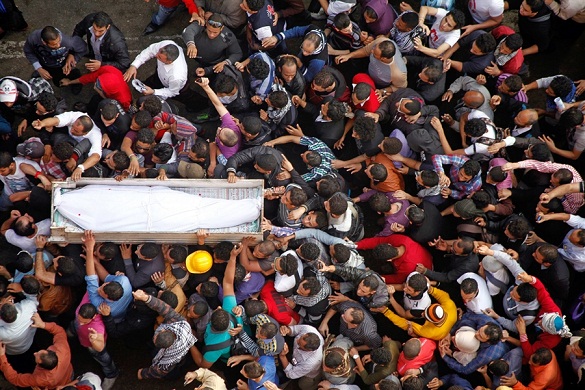CAIRO: In a closed board meeting earlier this week the National Council for Human Rights rehashed a draft law which would amend existing laws regulating construction, expansion, and renovation of houses of worship.
Board members from the National Council for Human Rights told Daily News Egypt that the board unanimously agreed on 25 of the 26 articles of the draft law, which would amend Law 106, regulating the legalities of constructing religious buildings.
One of the main departures from the existing law would make the process of expansion and renovations of places of worship equivalent for Christians and Muslims.
Under the current law, presidential permission is needed to construct a new church, while the building of a new mosque carries no such requirement.
A more controversial article relates to construction of places of worship for religions other than the three ‘heavenly religions.’ Board members discussed deleting Article 7 from the proposed draft law, which would by its wording make it difficult or impossible for other religions to construct their own places of worship.
Opponents to the article, which include Osama Al-Ghazali Harb, Mohamed Abdel Aal, and Mona Zulfikar, argue that any religion should be able to construct a house of worship, including Shia, Bahaii, Buddhists, or any other religion existing in Egypt.
“There are restrictive rules for those who want to build a religious place of worship, says board member Hafez Abu Seada. He says that the majority were in favor of dissolving Article 7.
Member Mounir Fakhri Abdel Nour, however, told Daily News Egypt that reports by Al-Masry Al-Youm on the council’s disagreements were greatly inaccurate, saying that the council’s opinion on the draft law was “unanimous.
He explains that the problem with the existing draft is that it defines which religious authorities would grant permits for new construction, thereby limiting construction for other religions, such as Shia, Buddhist, or Bahaii. “The council is a strong advocate for the right of [other religions] to worship freely.
An alternative would be for a more general administrative authority to grant the permits.
Chairman of the NCHR Boutros Boutros-Ghali concluded the meeting by demanding a written request to article amendments.
The member who drafted the proposed law, Layla Takla, was unavailable for comment.
The council meeting was meant to expedite the discussion of the proposed draft law which was first presented to the People’s Assembly in 2006. In mid-July, the council presented the draft law to the Cabinet of Ministers, People s Assembly, Shura Council and Ministry of State for Legal and Parliamentary Affairs.
Sheikh Saber Taalab showed approval for the part of the draft law dealing with equalization of permit procedures for churches and mosques. He told Daily News Egypt that the proposed amendments posed no danger to Islam. “Every religion has the right to have its own place of worship .the Quran states “la ikrha fil deen (there is no compulsion in religion). Otherwise, there will be no mosques in Europe . even Italy, which houses the Catholic Church still has mosques everywhere.
Regarding the construction of places of worship for all religions, however, Taalab disagreed with the proposed changes. “The heavenly religions are the only ones who should have the right to have their own places of worship.
Law 106 has been instated since 1976. Since then, however, articles have been amended decreasing differences between church and mosque construction and repair.
In 2005, President Hosni Mubarak eased restrictions on church repair with Presidential Decree 291, allowing for repairs without governmental approval, allocating permission to local governors.
